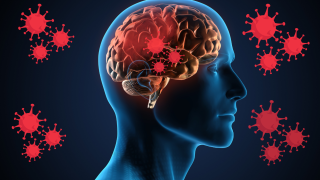Long Covid
Serotonin’s Role in Long Covid
A potential biomarker and therapeutic target.
Posted October 26, 2023 Reviewed by Gary Drevitch
Key points
- New research suggests that long Covid is associated with lower levels of circulating serotonin.
- Serotonin levels are depleted due to an abnormal immune response involving type-I interferons.
- The resultant serotonin deficiency reduces vagal nerve signaling, leading to neurocognitive symptoms.

Long COVID continues to be a major problem for millions of people. Loosely defined as the experience of new or persistent symptoms four or more weeks after initial infection with the SARS-CoV-2 virus, the percentage of U.S. adults with long COVID has remained between 5.6 percent and 7.6 percent since late spring 2022. The incidence is believed to be between 10 and 12 percent in cases in which the patient has been vaccinated, 10 to 30 percent for non-hospitalized cases, and 50 to 70 percent for hospitalized cases. The Centers for Disease Control and Prevention estimated in June 2023 that around 1 in 4 patients with long COVID had symptoms severe enough to result in significant activity limitations.
Not all patients affected by long COVID experience the same types of symptoms, and in fact extreme symptom heterogeneity has been one of the most confounding aspects when it comes to determining the pathophysiology of long COVID. A Lancet paper published in 2021 by Davis and colleagues analyzed survey responses from 3,762 participants and counted 203 symptoms across 10 organ systems, the most common of which were fatigue, post-exertional malaise, and cognitive dysfunction (e.g., memory impairment, “brain fog," sleep disturbance, and depressed mood). More recently, researchers have attempted to classify long COVID by clinical subtype, though there is not yet firm consensus on the number of phenotypes defined by distinct symptom clusters. Some have proposed that there are four clinical subtypes, while others have argued that there are six or even eight distinct phenotypes.
In addition to there being a variety of symptom clusters, research has indicated that there are likely multiple causes for long COVID, and that different etiologies correspond with different clinical phenotypes. These suspected etiologies include a prolonged inflammatory response (either due to the continued presence of viral reservoirs in the body or not), autonomic nervous system dysfunction, and a combination of platelet dysfunction and hypercoagulability (resulting in microthrombi or “microclots”).
A satisfactory reason why some develop long COVID while others do not has remained elusive, though lower socioeconomic status, female sex, type 2 diabetes, previous infection with Epstein-Barr virus, and numerous autoimmune disorders have all been proposed as risk factors with varying confidence. However, a new paper published in Cell by Wong and colleagues may shed new light on the subject, as the authors suggest that there may be one molecular biomarker for long COVID that can accurately predict patients who are at an increased risk of developing long COVID. It may also reveal that many of the symptoms of long COVID have a shared pathogenesis.
A Common Pathway
Following a series of experiments, the paper’s authors concluded that circulating levels of the neurotransmitter serotonin were depleted in those with acute COVID-19 infections and those with long COVID, but not those who recovered, suggesting that serotonin levels could be a predictive biomarker for long COVID.
The authors then explored why serotonin levels declined. By using mouse models, they noted that the presence of SARS-CoV-2 RNA triggered inflammation driven by the increased signaling of a subset of proteins produced by the body to fight infections known as type I interferons (IFNs). Increased IFN signaling is not a unique result of SARS-CoV-2 infection; it is part of the immune system’s natural inflammatory response to infection, and all viral infections appear to stimulate increased IFN signaling. It appears that declines in serotonin levels are also normal during periods of infection.
IFN signaling can lead to three distinct phenomena that affect serotonin levels. First, IFN signaling in the gut disrupts the absorption of dietary tryptophan (a serotonin precursor). As the majority of serotonin in the body is synthesized in the gut, this has a significant impact on circulating serotonin. Once it is synthesized in the gut, serotonin is then transported inside platelets, whereas free serotonin is quickly metabolized. As IFN-mediated inflammation leads to platelet hyperactivation, increased clotting, and low platelet counts. This leads to the second phenomenon affecting serotonin levels: As it is transported in platelets, the decline in platelet counts results in lower circulating serotonin levels, as well. Finally, inflammation is associated with an increase in the production of the enzymes that metabolize serotonin, resulting in a higher rate of serotonin turnover.
The Results of Decreased Serotonin
The increased presence of microclots may certainly explain some of the cardiovascular, respiratory, and psychological symptoms of long COVID, but their presence does not appear to be sufficient for many of the neurocognitive symptoms associated with it—i.e., anxiety, memory problems, sleep disruptions, and brain fog. While some of these symptoms may be associated with neuroinflammation, the Cell paper suggests an alternative etiology based on serotonin depletion.
Surprisingly, this is not due to declines in serotonin levels in the brain, which were unaffected by viral infection in mouse models. Instead, they were due to depleted circulating serotonin levels, which interact with the sensory neurons of the peripheral nervous system. The authors found that reduced sensory neuron activity, specifically reductions in vagus nerve activity, were associated with the neurocognitive symptoms of long COVID in mouse models. More importantly, administration of a serotonin receptor (5-HT3) agonist to the affected mice ostensibly resulted in symptom improvement.
Further Implications
The results of the paper are preliminary and more studies need to verify the findings, but their conclusion that "serotonin reduction dampens vagal signaling and thereby impairs cognitive function" provides clinicians with potential therapies that may include serotonin precursor supplementation or the use of treatments that boost serotonin levels, whether they are pharmaceutical (i.e. SSRIs) or non-pharmaceutical (e.g., light therapy, increased exercise, improved diet). Moreover, this pathway connecting elevated IFN levels with decreases in vagal signaling and cognitive functioning may also have major implications for immune disorders like multiple sclerosis and lupus. Finally, the paper represents additional evidence of the centrality of the gut-brain axis and the need to expand beyond targets in the central nervous system when treating psychological and neurocognitive symptoms.
Of note, this article was written entirely by a human with no assistance from generative AI tools.




